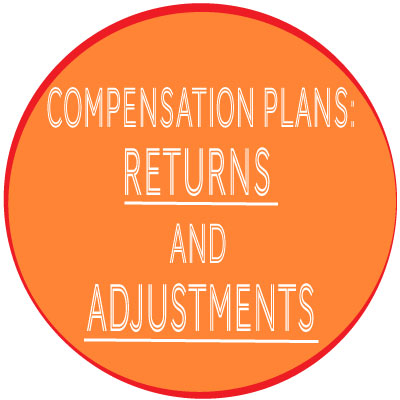 Upon fully paid orders, commissions and bonuses are paid out. But what happens when a commissioned order is canceled or the product is returned? What should you do?
Upon fully paid orders, commissions and bonuses are paid out. But what happens when a commissioned order is canceled or the product is returned? What should you do?
The good news is that you have some good choices. There are four approaches that network marketing and party plan direct selling companies use in responding to canceled orders or product returns on a transaction that has already been commissioned.
-
- From the people who earned it, commissions and bonuses that were paid to them are collected from earnings in future commission runs. What happens if one or more of these people don’t have future earnings? In this case, you won’t collect it.
- This approach is good because only those people who earned commissions and bonuses have them taken away from them.
- This approach works only if your system knows who earned compensation upon the order for which there was a return. If you don’t know this information (for example, if yours is a binary compensation plan which pays upon accumulated volumes instead of by order), then this approach is not an option for you.
- It’s not so good for the company, because not every commission or bonus paid will be collected back.
- Negative sales orders are created in the next commission run. A negative sales order is identical to a new sales order in every way, except that instead of paying representatives, money is collected from them.
- This approach is good, because virtually all of the money paid out is collected back.
- However, because the people eligible for compensation in this commission run may be different from those paid on the original transaction, we may be taking money from people who did not earn it in the first place.
- The third approach is to do nothing. This approach is taken by some companies whose order cancellations and returns are very small.
- If you do nothing, then you will not collect back any of the commissions or bonuses paid on the canceled order or product return.
- By doing nothing, you will not upset any representatives by taking money back from them.
- The fourth approach is to not perform the final commission run for a commission period until after your return period has ended. With this approach, there will be no lagging effect on compensation from product returns, because when you perform the final commission run for a commission period, that run will be performed on transactions which take into account product returns.
- From the people who earned it, commissions and bonuses that were paid to them are collected from earnings in future commission runs. What happens if one or more of these people don’t have future earnings? In this case, you won’t collect it.
Another issue to address is whether to reduce the Personal Sales Volume, Group Sales Volume, or other volumes that included the items on the original order. If you choose to reduce volumes in a future commission run as a result of canceled orders or product returns, the result may be that one or more representatives may find themselves to be inactive or unqualified or not meet their rank maintenance requirements in that future commission run. To eliminate unpleasant surprises, some companies choose not to reduce future volumes as a result of product returns or canceled orders.
It is impractical to recalculate compensation for an entire commission run that contains an order for which there was a product return and then to create commission adjustments as a result of the return. It is important to be able to explain clearly to your independent sales representatives whatever actions you choose to take. It would be too confusing to your sales force to show them the details of the original commission run and the revised commission run and how their compensation was affected as a result of a product return. So, instead choose one of the four options above.
Which approach is best for your company? The answer is that it depends on two factors: your compensation plan and the functionality provided by your MLM software.
Whatever you decide, be sure to update your Policies and Procedures to cover this.
If you need help making these important decisions, contact us at Sylvina Consulting.

 Jay Leisner, the President of Sylvina Consulting, is a top compensation plan and direct selling expert, a trusted adviser to new and established network marketing and party plan companies. For more than 30 years, Jay has enjoyed assessing and improving network marketing, party plan and referral marketing companies across the globe.
Jay Leisner, the President of Sylvina Consulting, is a top compensation plan and direct selling expert, a trusted adviser to new and established network marketing and party plan companies. For more than 30 years, Jay has enjoyed assessing and improving network marketing, party plan and referral marketing companies across the globe.
Leave a Reply